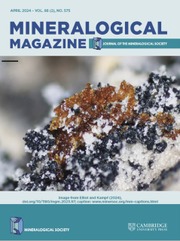Article contents
REE zoning in allanite related to changing partition coefficients during crystallization: implications for REE behaviour in an epidote-bearing tonalite
Published online by Cambridge University Press: 05 July 2018
Abstract
Allanite is present in most samples of the tonalitic Bell Island Pluton, with an average mode near 0.05 wt.%. Allanite occurs as cores in igneous epidote-clinozoisite and exhibits characteristic and consistent zoning patterns. REE-rich cores (All40-70) grade out towards epidote-clinozoisite with REE below electron microprobe detection limits. La, Ce and Pr contents are highest in the REE-rich cores of zoned crystals. Nd and Sm contents both initially increase as total REE decreases and are highest in intermediate zones. Y contents are generally low throughout, but tend to be highest in analyses with A115-20. The zoning behaviour exhibited by the allanite, specifically the rimward increases in Nd, Sm, and Y, cannot be accounted for by simple fractionation and are best explained by increases in allanite/ melt partition coefficients (Kd values) for these elements during crystallization. We propose that the variation in Kd values reflects modification of the allanite structure with changing REE content. These modifications are manifested by changes in colour, extinction, and pleochroism within the zoned crystals and include changes in unit-cell volume and dimensions. The changes in Kd values are large enough to result in crossing REE patterns within single allanite crystals. Fractional crystallization of zoned allanite can have noticeable effects on LREE contents and La/Sm (and almost certainly La/Lu) in magmas. In the Bell Island pluton, 80% of La, but <3% of Y is contained in allanite. Although some of the variation in the LREE chemistry of the pluton is attributable to statistical sampling error, much of it appears to reflect petrogenetic processes that controlled LREE abundance and, ultimately, allanite mode. One sample of Bell Island tonalite is depleted in LREE and has low La/Lu and La/Sm. These chemical features can be modelled by fractionation of zoned allanite.
- Type
- Editorial
- Information
- Copyright
- Copyright © The Mineralogical Society of Great Britain and Ireland 2006
References
- 16
- Cited by


